Weighted and Unweighted GPA Calculator for High School
Take the following 5 steps to use the tool:
- Choose the GPA calculator: weighted or unweighted;
- Select the grading standard – percentages or letters;
- Insert the grades for a current or past semester;
- See the semester GPA and the total GPA counted automatically;
- Add another semester if necessary.
👨🎓️ What Is High School GPA?
GPA means Grade Point Average. This is a way to measure a student's academic performance in high school or college.
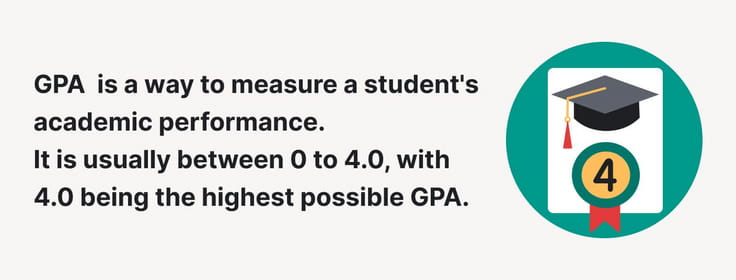
To count a GPA, one has to divide the total number of grade points earned by the total number of credits taken. The GPA is usually calculated on a scale of 0 to 4.0, with 4.0 being the highest possible GPA.
As an excellent way to reflect a high school student's academic ability and potential, GPA is essential in college admissions.
Most colleges and universities have minimum GPA requirements for admission, and a high GPA can make a student a more competitive applicant. It is also crucial for students to maintain a high GPA to stay in good academic standing and be eligible for scholarships and financial aid programs.
⚖️ Weighted and Unweighted GPA: Why Calculate It?
The most difficult part about calculating your current GPA is the difference between weighted and unweighted courses.
- How to know if your school gives extra points for certain classes?
- How to transform your letter grade into a percentage if the course is weighted?
- Are there any advantages of taking AP or Honors classes?
In this chapter, we’ll answer all these questions. Just keep reading!
Unweighted GPA
Usually, you get letter grades for passed courses throughout the year. There’s nothing difficult in converting those letters into a percentage (read the next chapter to figure out how exactly) until there are weighted courses.
With unweighted GPA system, there are possibilities of having a regular letter grading or one with pluses and minuses.
In this case, every letter with plus or minus has its own GPA values, except for A and A+ that both equals 4.0.
Weighted GPA
This is where everything becomes more complicated, but we’re here to help!
In many schools, there are classes with higher standards. They are usually called AP (Advanced Placement) programs. Their mission is to give more information than regular courses do and prepare you for a college. These classes also are a great chance to earn points in your future college while you’re still a high-school student.
APs are usually scored on a scale of 1.0 to 5.0 but can also be higher, depending on your school’s decision.
Why take those courses?
The entire period that you spend in high school, you’re fighting for the place in a college. The majority of colleges appreciate it when you take challenges during your studies. Even if you get a B, it still shows you as a dedicated student, and, by the way, when converted into GPA, AP’s B equals 4.0, which is A or A+ in your regular courses. It also introduces you to the college program, and you may try out your skills and learn your weaknesses.
Along with regular and AP classes, there are also Honors ones. Their scores are more challenging to achieve, that’s why they usually are estimated 0.5 higher than regular courses.
For example, if you get B- it equals 2.7 for regular courses and 3.2 for Honors courses.
In conclusion, we must say: you don’t have to attend every weighted class. It’s still important to gain as high grades as you can during regular classes, prepare for SAT, and participate in clubs and scholarships.
Weighted & Unweighted GPA Calculators
The difference between an unweighted and weighted GPA calculator is that the latter takes into account you’re the type of the course: regular, AP, or honors.
When computing your GPA, be careful to use the calculator that suits your requirements.
In other words, if you’re a student who attends AP or Honors classes and wants to know the exact GPA, use only those calculators that consider weighted courses.
🧮 How to Calculate GPA in High School?
There are several excellent tools for GPA calculating online. Using one of them is the best way to figure out all you want to know in a short period.
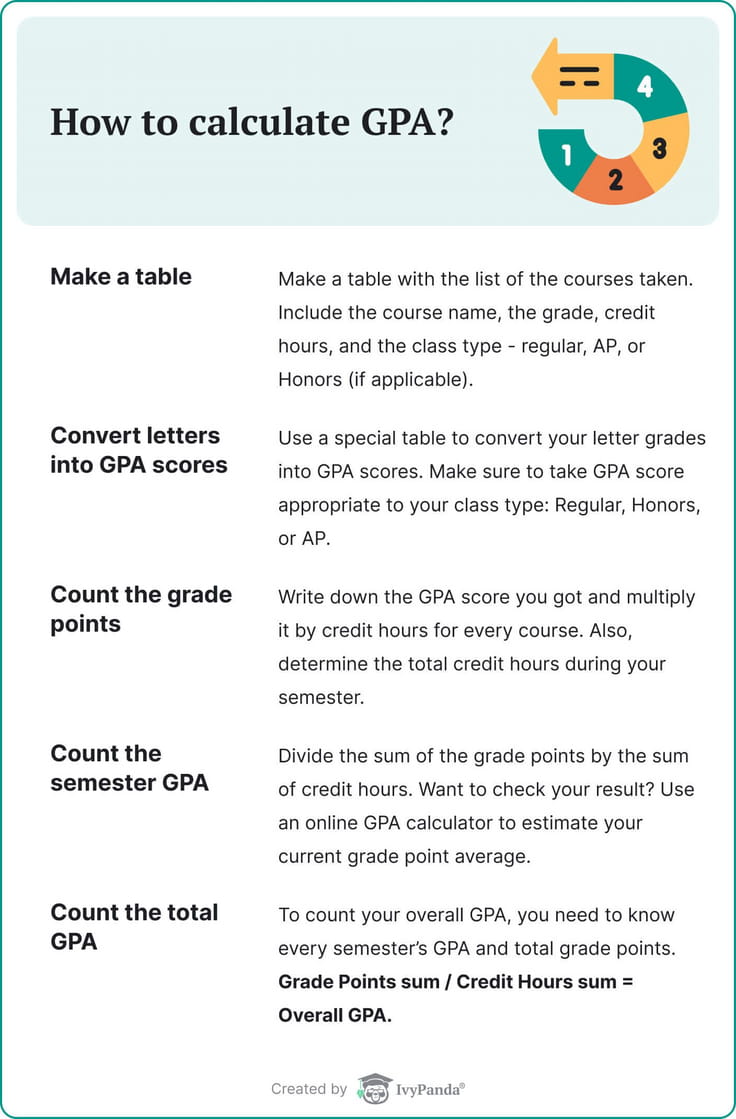
Don’t always have access to the internet? Then, we’ll teach you to calculate GPA without any tools.
This chapter is a detailed guide on how to do it on a piece of paper with the help of the formula and a couple of tables.
Step 1 – Make a Table of the Courses
Make a table with the list of the courses taken. See the example below. Be accurate when filling in your class types as they determine how high your letter grades are. Also, notice that credit hours may be different for two courses.
Step 2 – Convert Letter Grades into Percentages
After that, use the following table to convert letter grades into percentages. Make sure to take GPA score appropriate to your class type: Regular, Honors, or AP.
Step 3 – Count the Grade Points
To do that, write down the score you you got for each of the classes and multiply it by credit hours for every course. Also, determine the total credit hours during your semester.
Step 4 – Count the Semester GPA
Divide the sum of the grade points by the sum of credit hours:
70/17 = 4.12
In our example, 4.12 is the student’s GPA.
Want to check your result? Use an online GPA calculator to estimate your current grade point average.
Step 5 – Count the Total GPA
Many students have been asking about the overall GPA formula.
To figure out cumulative GPA, you need to know every semester’s GPA and total grade points. To know grade points, you should simply multiply GPA by credit hours. After that, divide the total number of grade points by the sum of credit hours:
Grade Points sum / Credit Hours sum = Overall GPA
208.5/53 = 3.9
These were guidelines on how to calculate high-school GPA on a weighted scale (5.0) or unweighted scale (4.0). If you still have any questions, feel free to ask them in comments!
☝️ How to Raise Your High-School GPA?
This chapter is the last part of our guide but may be the most significant.
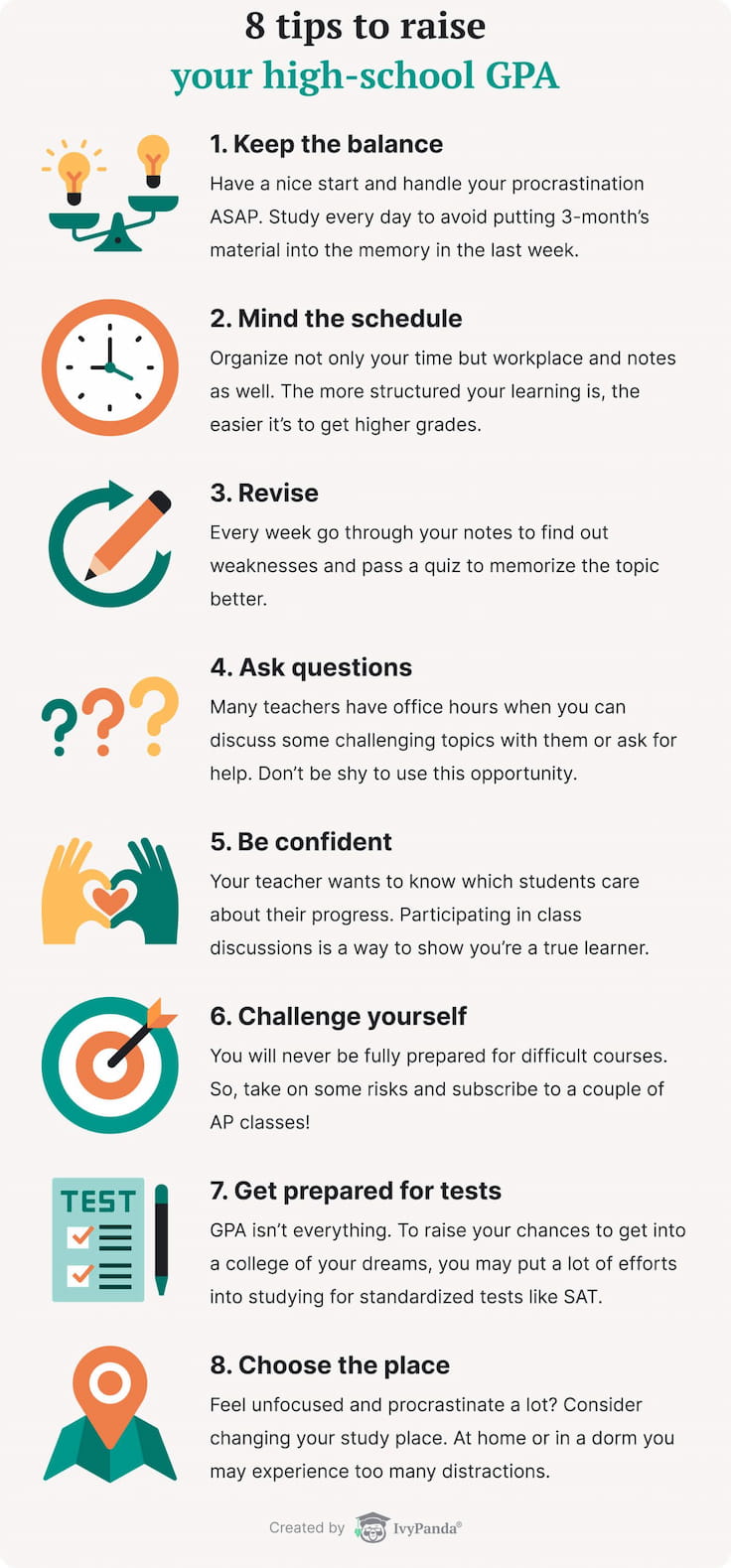
Once you figure out your GPA, you may want to make it even higher. That’s why we’ve collected some pretty helpful tips to show you the right direction.
Ready?
1. Keep the Balance
The most common problem students may have with GPA is when they start putting efforts only during the last weeks. This attitude projects on all of your studies even if you catch up all the material at the end.
So, our tip is to have a nice start and handle your procrastination as soon as possible. Study every day to avoid putting 3-month’s material into the memory in the last week.
2. Mind the Schedule
Determine the hours at which you’re most productive and include them in your schedule. Stick to the plan. Put all the efforts to follow your schedule.
Organize not only your time but workplace and notes as well. The more structured your learning is, the easier it’s to get higher grades.
3. Revise
Any school program implies daily and weekly revisions of the material you get. Make sure you catch up with understanding and remembering all the significant information.
Every week go through your notes to find out weaknesses and pass a quiz to memorize the topic better.
4. Ask Questions
The majority of teachers have office hours when you can discuss some challenging topics with them or ask for help. Don’t be shy to use this opportunity as long as it helps to understand the subject and shows your teacher you care about the studies.
5. Be Confident
It may seem boring or uncomfortable to participate in discussions in a class but give it a try. Your teacher wants to know which students care about their grades and make the challenging work to improve.
The only way to show them is to participate in their lessons.
6. Challenge Yourself
You will never be fully prepared for difficult courses. So, take on some risks and subscribe to a couple of AP classes!
It’s significant to attend some because any college you’ll apply in future is interested in this aspect of your academic achievements. The higher grades you have for AP classes, the more your GPA and chances to get into a good college are.
7. Learn for Tests
GPA isn’t everything. To raise your chances to get into a college of your dreams, you may put a lot of efforts into studying for standardized tests like SAT.
You can find a lot of worksheets and guides online to practice.
8. Choose the Place
Feel unfocused and procrastinate a lot? Try to change your studying place. At home or in a dorm you may experience too loud noises and many distractions.
If you study at the library or in an empty class, things are different. You feel more concentrated and can accomplish more tasks at a time.
These were tips on how to raise your GPA, and now you’re definitely ready to know your result. We hope, our guide is helpful to calculate your high-school GPA whether using tools, detailed guidelines, or charts.
🏆 6 Best High-school GPA Calculators
Many students are puzzled by the question—how high-school GPA is calculated.
The point is:
If you have access to the Internet, you don’t need to figure it out on your own.
1. IvyPanda GPA Calculator
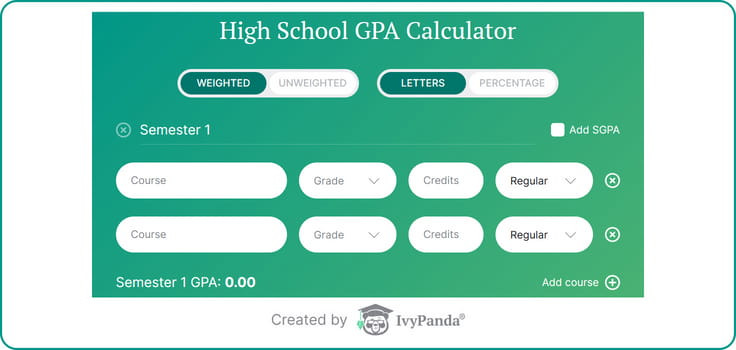
A high-school GPA calculator by IvyPanda is user-friendly and versatile. The tool is suitable for counting both weighted and unweighted GPA. Moreover, it allows you to use either letter or percentage grading standard.
To calculate a semester GPA, you need to insert the course names, grades, credits, and course types in case you’re using the weighted version. Your semester GPA will be counted automatically. To count an overall GPA for several semesters, you need to add another semester and insert all the necessary information once again.
2. GPACalculator.net
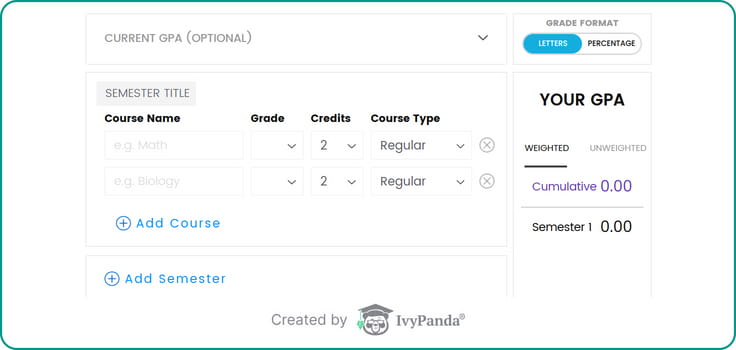
This one is both a letter and a percentage GPA calculator. You can easily switch between formats by clicking Grade Format button in the top right corner.
Then, you’re free to put data like course names, credit hours, and grades. If you wish, you can add other semesters that are calculated automatically as long as you do.
Below the tool, you’ll find useful instructions on how to calculate. Although the tool is super easy to use, you’ll find illustrative examples and detailed guidelines.
3. GPACalculator.io
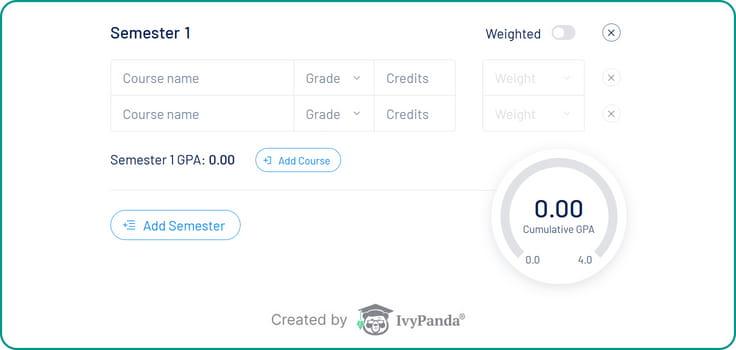
Another good tool to know your GPA in seconds.
You can control the process by switching between weighted and unweighted grades. When you turn on weighted grades, you can choose Honors, IB, AP, and College credits.
Want to know your GPA for four years? Just add as many semesters as you need.
By the way, the cumulative GPA is presented within the pie—it’s comfortable to estimate your abilities with such visualization.
4. Scholaro GPA Tool
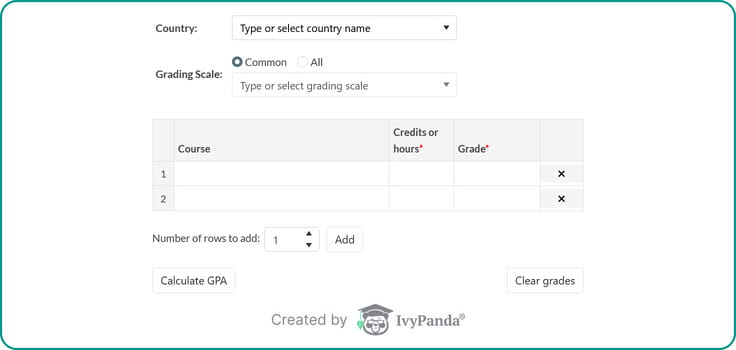
Scholaro is an international GPA calculator that allows you to convert grades or points from any country to the U.S. grades and calculate GPA.
Choose the country and grading scale, type your grades and find out your GPA. The tool also allows you to save the GPA report.
Scholaro will be especially helpful for international students who plan to apply to US schools, colleges or universities.
5. Studentshare GPA Tool
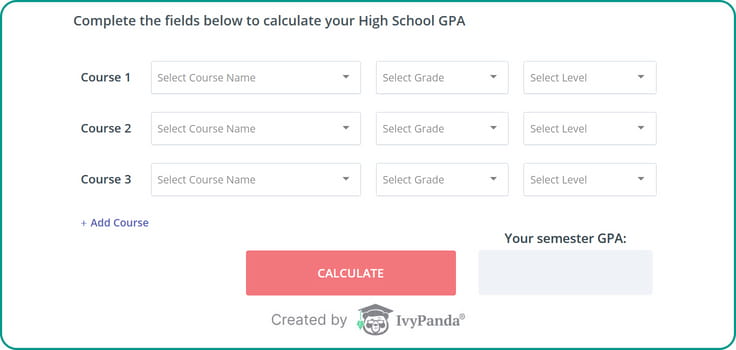
A fantastic tool to calculate GPA on the 12-point scale. Enter your data, e-mail, and get the result!
The best part about this scoring calculator:
You don’t have to enter courses’ names and letter grades. Just choose them right on the page.
The list of subjects is enormous—along with Math, Science, and History, you can choose Genetics, Anthropology, Interpersonal Communications, Liberal Arts, Manufacturing, and more.
6. College Simply GPA Tool
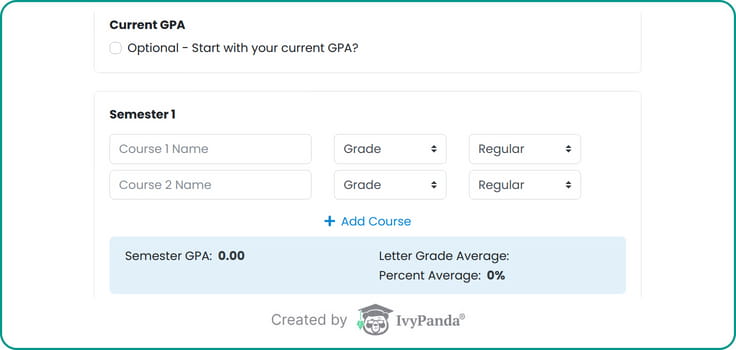
This tool is developed for those who want easily know their GPA by using a weighted GPA calculator. The difference between high-school and college GPA is that in high school, there are often specific courses that have higher worth such as AP, Honors, or College.
They’re classified as weighted as long as they’re much harder to pass. This way, you get 0.5 or 1 point higher grade than during regular classes.
For one class, you can choose only grade and course type (Regular, AP/Honors, College).
📝 High-school GPA Calculator: the Benefits
❓ High School GPA Calculator FAQ
Updated: